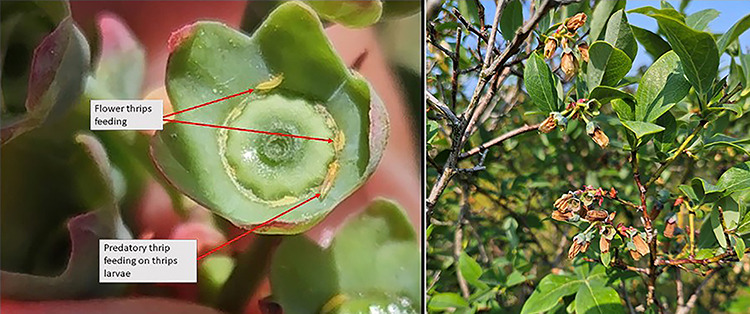West central Michigan small fruit update – June 7, 2023
High daily temperatures and lack of rain increase the need for supplemental irrigation and promote insect pest outbreaks in blueberries.

West Michigan is going through a period of high daily temperatures and unseasonal drought that may affect plant growth and development in most fruit crops including blueberries, strawberries and raspberries. Prevailing daily maximum temperatures around west central Michigan have been fluctuating between the upper 70s degrees Fahrenheit and lower 90s F. For the past seven days, maximum temperatures averaged 89 F under severe drought conditions. There has been more than 30 days since we observed a significative precipitation in the region.
Extreme weather conditions are occurring when blueberries’ water demand is critical for fruit and plant growth. If there is not enough water, blueberry plants prioritize plant structure (shoots and leaves) over fruit production and water is extracted from green fruits. That will increase the June drop and may affect fruit quality and yield. Therefore, keep your irrigation system running when daily maximum temperatures increase above 85 F, and turn it off as soon as the air temperature drops below 85 F. That will compensate for the water lost via evapotranspiration and will prevent fruit sunscald due to high temperatures.
Another issue related to the effect of high temperatures and dry conditions is insect pest outbreaks. We are finding that flower thrips are becoming a serious problem in blueberries. Thrips feeding in flowers and fruitlets is resulting in flower abortion and extensive June drop in some blueberry fields with high thrip infestation. Symptoms of thrips damage started appearing two weeks ago. However, the damage was mistakenly considered a light frost damage (Photo 2). At fields already affected, it is too late for controlling the problem. However, if the population continues to increase and the natural control is unable to maintain the thrips populations at bay, insecticide applications will be required to avoid fruit damage that may decrease the fruit quality.

If during your integrated pest management scouting you find symptoms similar to those shown in the picture and you are ready to apply the second application against fruitworms, consider using an insecticide with activity against both pests. Some of the recommended insecticides with action against fruitworms and thrips are Delegate, Entrust and Assail. Please consult the Michigan State University Extension Fruit Management Guide (Bulletin E-154) for more insecticide options.



 Print
Print Email
Email




